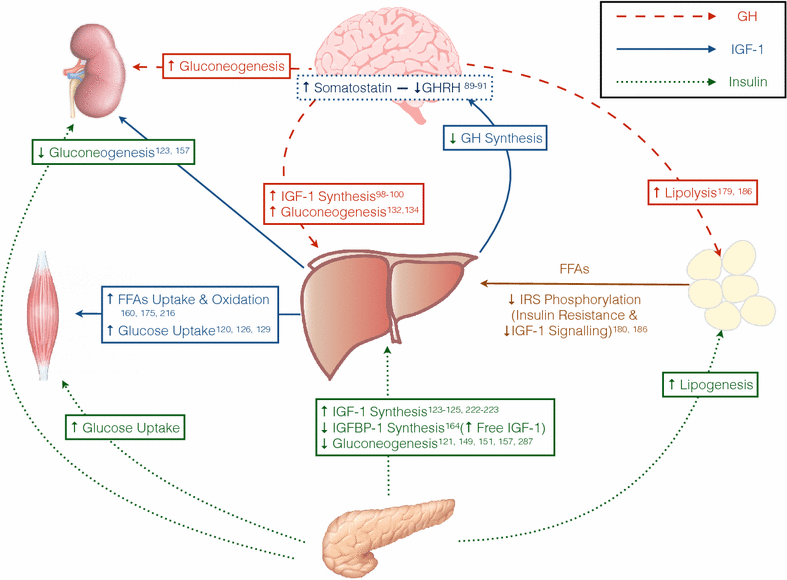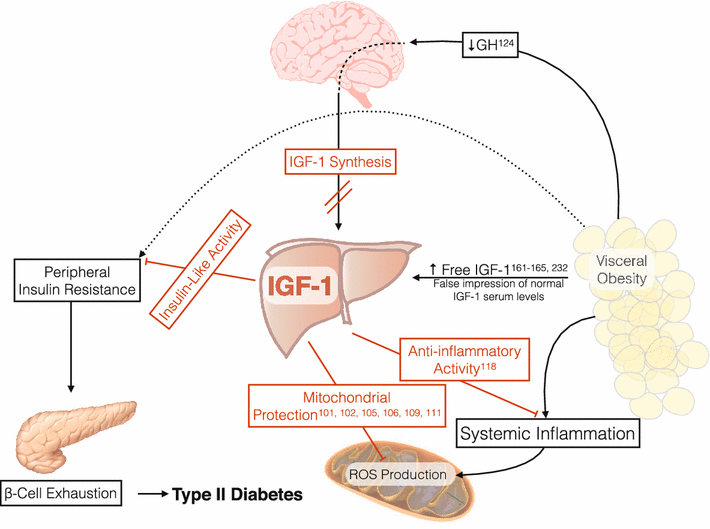Insulin-like growth factor-1 deficiency and metabolic syndrome
- PMID: 26733412
- PMCID: PMC4702316
- DOI: 10.1186/s12967-015-0762-z
Insulin-like growth factor-1 deficiency and metabolic syndrome
Abstract
Consistent evidence associates IGF-1 deficiency and metabolic syndrome. In this review, we will focus on the metabolic effects of IGF-1, the concept of metabolic syndrome and its clinical manifestations (impaired lipid profile, insulin resistance, increased glucose levels, obesity, and cardiovascular disease), discussing whether IGF-1 replacement therapy could be a beneficial strategy for these patients. The search plan was made in Medline for Pubmed with the following mesh terms: IGF-1 and "metabolism, carbohydrate, lipids, proteins, amino acids, metabolic syndrome, cardiovascular disease, diabetes" between the years 1963-2015. The search includes animal and human protocols. In this review we discuss the relevant actions of IGF-1 on metabolism and the implication of IGF-1 deficiency in the establishment of metabolic syndrome. Multiple studies (in vitro and in vivo) demonstrate the association between IGF-1 deficit and deregulated lipid metabolism, cardiovascular disease, diabetes, and an altered metabolic profile of diabetic patients. Based on the available data we propose IGF-1 as a key hormone in the pathophysiology of metabolic syndrome; due to its implications in the metabolism of carbohydrates and lipids. Previous data demonstrates how IGF-1 can be an effective option in the treatment of this worldwide increasing condition. It has to distinguished that the replacement therapy should be only undertaken to restore the physiological levels, never to exceed physiological ranges.
Figures


Similar articles
-
Altered liver expression of genes involved in lipid and glucose metabolism in mice with partial IGF-1 deficiency: an experimental approach to metabolic syndrome.J Transl Med. 2015 Oct 14;13:326. doi: 10.1186/s12967-015-0684-9. J Transl Med. 2015. PMID: 26467524 Free PMC article.
-
The insulin-like growth factor I system: physiological and pathophysiological implication in cardiovascular diseases associated with metabolic syndrome.Biochem Pharmacol. 2015 Feb 15;93(4):409-17. doi: 10.1016/j.bcp.2014.12.006. Epub 2014 Dec 23. Biochem Pharmacol. 2015. PMID: 25541285 Review.
-
Metabolic actions of insulin-like growth factor-I in normal physiology and diabetes.Endocrinol Metab Clin North Am. 2012 Jun;41(2):425-43, vii-viii. doi: 10.1016/j.ecl.2012.04.017. Endocrinol Metab Clin North Am. 2012. PMID: 22682639 Free PMC article. Review.
-
Insulin-like growth factor I, growth hormone, and insulin sensitivity: the effects of a one-year cholecalciferol supplementation in middle-aged overweight and obese subjects.Endocrine. 2013 Apr;43(2):412-8. doi: 10.1007/s12020-012-9825-6. Epub 2012 Oct 30. Endocrine. 2013. PMID: 23109222 Clinical Trial.
-
Endocrine and metabolic aspects of adult Prader-Willi syndrome with special emphasis on the effect of growth hormone treatment.Growth Horm IGF Res. 2004 Feb;14(1):1-15. doi: 10.1016/j.ghir.2003.09.003. Growth Horm IGF Res. 2004. PMID: 14700552 Clinical Trial.
Cited by
-
Correlation of tri-ponderal mass index with insulin-like growth factor-I and insulin-like growth factor binding protein-3 in children and adolescents.Ann Pediatr Endocrinol Metab. 2024 Aug;29(4):258-265. doi: 10.6065/apem.2346158.079. Epub 2024 Aug 31. Ann Pediatr Endocrinol Metab. 2024. PMID: 39231487 Free PMC article.
-
Implications of metabolism-driven myeloid dysfunctions in cancer therapy.Cell Mol Immunol. 2021 Apr;18(4):829-841. doi: 10.1038/s41423-020-00556-w. Epub 2020 Oct 19. Cell Mol Immunol. 2021. PMID: 33077904 Free PMC article. Review.
-
Fenugreek Stimulates the Expression of Genes Involved in Milk Synthesis and Milk Flow through Modulation of Insulin/GH/IGF-1 Axis and Oxytocin Secretion.Genes (Basel). 2020 Oct 16;11(10):1208. doi: 10.3390/genes11101208. Genes (Basel). 2020. PMID: 33081164 Free PMC article.
-
Healthy glucocorticoid receptor N363S carriers dysregulate gene expression associated with metabolic syndrome.Am J Physiol Endocrinol Metab. 2016 Oct 1;311(4):E741-E748. doi: 10.1152/ajpendo.00105.2016. Epub 2016 Sep 6. Am J Physiol Endocrinol Metab. 2016. PMID: 27600822 Free PMC article.
-
Targeting Insulin-Like Growth Factor-I in Management of Neurological Disorders.Neurotox Res. 2022 Jun;40(3):874-883. doi: 10.1007/s12640-022-00513-7. Epub 2022 Apr 27. Neurotox Res. 2022. PMID: 35476315 Review.
References
-
- Alberti KGMM, Eckel RH, Grundy SM, Zimmet PZ, Cleeman JI, Donato KA, Fruchart JC, James WPT, Loria CM, Smith SC. Harmonizing the metabolic syndrome: a joint interim statement of the international diabetes federation task force on epidemiology and prevention; National heart, lung, and blood institute; American heart association; World heart federation; International. Circulation. 2009;120:1640–5. - PubMed
-
- Balkau B, Charles MA. Comment on the provisional report from the WHO consultation. Diabetic Med. 1999;16:442–3. - PubMed
-
- Alberti KGMM, Zimmet PZ. Definition, diagnosis and classification of diabetes mellitus and its complications. Part 1: diagnosis and classification of diabetes mellitus. Provisional report of a WHO consultation. Diabet Med. 1998;15:539–553. doi: 10.1002/(SICI)1096-9136(199807)15:7<539::AID-DIA668>3.0.CO;2-S. - DOI - PubMed
Publication types
MeSH terms
Substances
LinkOut - more resources
Full Text Sources
Other Literature Sources
Medical
Miscellaneous

